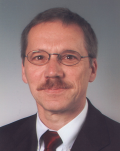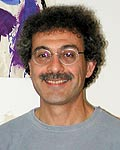Keynote Talks
Prof. Dr.-Ing. Peter Vary,
Institute of Communication Systems and Data Processing,
RWTH Aachen University
Speech Enhancement by Conditional Estimation: Noise Reduction, Error Concealment & Bandwidth Extension, what makes the difference?
In wireless speech communication systems several measures are taken to provide the required audio quality at the receiver. Besides speech and channel coding, algorithms for speech enhancement are applied to cope with the impairments resulting from acoustic background noise, telephone frequency characteristics, and residual bit errors. In the literature, advanced techniques for noise suppression, artificial bandwidth extension, and error concealment are treated as independent (sub-)disciplines of adaptive speech signal processing. However, these three approaches of speech enhancement are actually based on the same mathematics of conditional Bayesian estimation. In this contribution, a commonview and recent developments in these three areas are presented.
- 1972 Diploma Degree (Dipl.-Ing.) from Technical University Darmstadt
- 1972 – 1979 Research and teaching assistant in the field of Digital Signal Processing and Communications at the University of Erlangen-Nürnberg
- 1978 PhD on Digital Polyphase Filterbanks
- 1980 – 1988 Research and Development at "Philips Kommunikations Industrie AG", Nürnberg; head of the Digital Signal Processing Group
- since 10/88 Full professor at RWTH Aachen University
- 1992 – 1994 Dean of the Faculty of Electrical Engineering at RWTH Aachen University
Peter Vary was the leader of the winning industrial team (Philips, IBM) which designed the GSM full-rate codec in 1988. Since 1990 he and his group at RWTH University have a continuing tradition in contributing to international speech codec standards (GSM, UMTS, ITU). Furthermore, he made numerous original proposals in the field of digital speech transmission which have opened new directions of academic research and industrial applications (e.g. combined echo cancellation and noise reduction, wideband extension, soft decision source decoding, iterative source-channel decoding). The textbook "Digital Speech Transmission" (Wiley, 2005, together with Rainer Martin) is one of the first books which covers the fundamentals of the complete speech signal processing chain of modern cell phones.
Prof. Shihab Shamma,
Department of Electrical Engineering, University of Maryland
Cortical Spectrotemporal Modulations in Audio and Speech Processing
Spectrotemporal modulations are the basic carriers of information in speech, and of quality in music. In this talk, I shall review how these modulations are represented and extracted in the brain, and how we can abstract from this knowledge algorithms for the assessment and enhancement of speech intelligibility and audio quality.
This talk is based on the following references:
- T. Chi, P. Ru and S. A. Shamma, “Multiresolution spectrotemporal analysis of complex sounds,” Journal of the Acoustical Society of America, vol. 118, no. 2, pp. 887-906, August 2005
- N. Mesgarani and S. Shamma, “Denoising in the domain of spectrotemporal modulations,” EURASIP Journal on Audio, Speech, and Music Processing, vol. 2007, no.3, July 2007.
- N. Mesgarani, S. V. David, J. B. Fritz, and S. A. Shamma, “Phoneme representation and classification in the primary auditory cortex,” Journal of the Acoustical Society of America, vol. 123, no. 2, pp. 889-909, February 2008
 Shihab Shamma has been a member of the University of Maryland faculty since 1984 when he started as an Assistant Professor in the Electrical Engineering Department. He became an Associate Professor in 1989. He has been associated with the Systems Research Center since its inception in 1985, and received a joint appointment in 1990. Dr. Shamma also holds a joint appointment with the University of Maryland Institute for Advanced Computer Studies. He is a fellow of the Acoustical Society of America. Shihab Shamma received his B.S. degree in 1976 from Imperial College, in London, U.K. He received his M.S. and Ph.D. degrees in Electrical Engineering from Stanford University in 1977 and 1980, respectively. Dr. Shamma received his M.A. in Slavic Languages and Literature in 1980 from the same institution. Shihab Shamma has been a member of the University of Maryland faculty since 1984 when he started as an Assistant Professor in the Electrical Engineering Department. He became an Associate Professor in 1989. He has been associated with the Systems Research Center since its inception in 1985, and received a joint appointment in 1990. Dr. Shamma also holds a joint appointment with the University of Maryland Institute for Advanced Computer Studies. He is a fellow of the Acoustical Society of America. Shihab Shamma received his B.S. degree in 1976 from Imperial College, in London, U.K. He received his M.S. and Ph.D. degrees in Electrical Engineering from Stanford University in 1977 and 1980, respectively. Dr. Shamma received his M.A. in Slavic Languages and Literature in 1980 from the same institution.
|

